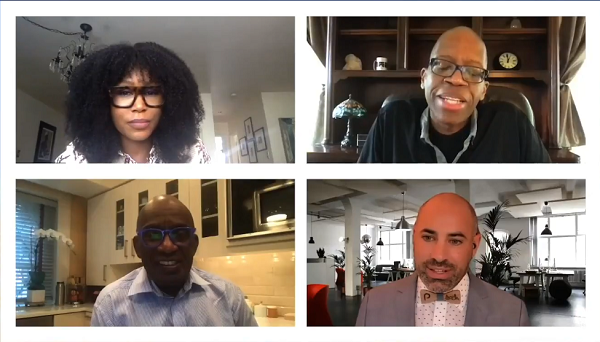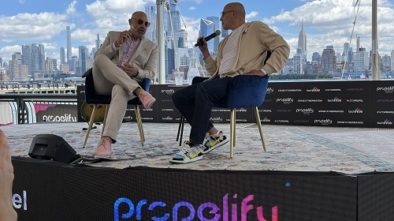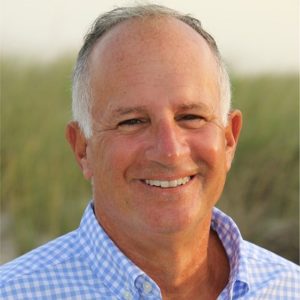At Propelify, Al Roker’s Panel on Diversity Concludes That Media is in for a Reckoning #BetterTogether
Diversity in the media was examined October 5 during the Propelify Innovation Festival, with NBC Today Show’s Al Roker and two other media experts saying that there aren’t nearly enough African-American decision-makers calling the shots at networks.
But that is about to change, they said.
“I hate to use the term ‘woke,’ but there is a wokeness when it comes to Hollywood. Even though their perception is that it’s this great liberal bastion, yet finding directors of color, writers of the color palette, it really isn’t that diverse,” Roker said.
“How much of a reckoning is Hollywood going through right now?” Roker asked Entertainment One Senior Vice President Madison Merritt.
“A significant one,” said Merritt, who was joined on the virtual panel by National Public Radio Chief Marketing Officer Michael Smith for the discussion, titled “Diversity and Inclusion in Media.”
“We are waking up, and I think that it is impossible for anybody to turn a blind eye right now. We had kind of the perfect convergence of COVID, and everybody making us stay at home, and being able to focus and not being distracted to see what was actually happening to black Americans,” said Merritt, who oversees the creation, development and sales of non-scripted series and content for Entertainment One. She has sold and developed shows for TLC, UPtv, VH1 and HGTV.
“We’re just not going to really take it anymore. I think that the fact that we have so much power, especially the spending power, we have the ability to pull ourselves together and to work together. I think the networks and streamers and distributors are definitely in, 100 percent, saying it’s time for a change,” Madison Merritt, Entertainment One
“We’re just not going to really take it anymore,” she said. “I think that the fact that we have so much power, especially the spending power, we have the ability to pull ourselves together and to work together. I think the networks and streamers and distributors are definitely in, 100 percent, saying it’s time for a change,” she said.
That is especially evident after a new study released last month by Citi found that racial inequality over the last two decades erased $16 trillion from the country’s GDP, Roker said.
The bulk of that lost GDP was attributed to the lack of lending to African-American entrepreneurs, which cost the U.S. $13 trillion in lost business revenue and 6.1 million in jobs, according to published reports.
The racial wealth gap for African-Americans in the U.S. cost another $2.7 trillion. Add that to the lack of access to higher education, which would have added $90 billion to $113 billion to lifetime incomes; and the inaccessibility of housing credit cost $218 billion, according to published reports.
If all the racial inequity gaps were immediately addressed, $5 trillion would be added back into the economy between now and 2025, according to published reports. To try to reverse matters, Citi unveiled plans to invest more than $1 billion in initiatives focused on closing the racial wealth gap, Roker said.
Need to Equalize the Playing Field
During the talk, Roker, Merritt and Smith discussed the need for more training and mentoring, an equalization of the playing field for African-Americans, an end to wage gaps, greater access to capital, and more opportunities at better schools.
Those changes must be made in board rooms, with more decision-makers that better reflect the demographics finally affecting viewer content.
Smith said, “I think music has been more democratized. I think one of the challenges with film and TV is that those businesses are still so centralized. If you think about television, there are three or four big companies, whether it’s Netflix or Disney or NBCU or Warner Media. They control so much of the art of what we see in theaters and what we see on television. And those companies, traditionally, while the content has been diverse, the leadership is not,” Smith said.
National Public Radio reaches 60 million people weekly on several of its platforms, including over 1,000 radio stations nationwide. Smith joined NPR in April.
Lack of Diversity on Company Boards
“When I look at the About Us pages of most of these major companies, and look at those senior executives or look at the boards in those companies, you don’t see a lot of diversity,” Smith said.
“It’s hard for us to break through the glass ceilings, and it’s incumbent upon white leadership to realize they have to go beyond and really reach out to promote more diversity in their staffs because their businesses perish if they don’t,” he added.
Listener content, meanwhile, has been changing at NPR, Smith said.
More funds for content have led to more podcasting and audio. That has paved the way for younger listeners and the democracy of online media, and younger listeners creating programming that eventually makes it onto more mainstream media.
“There is a lot of great content on NPR, but I think the problem is we’ve been very insular. And we really have done no marketing. I’m actually only the third chief marketing officer that the company’s ever had,” he said.
They all agreed that diverse content requires diverse decision-makers making and greenlighting projects. Workplace discriminatory practices and wage gaps must be addressed.
Smith said, “I was pleasantly surprised that a lot had been going on within NPR for the last few years to diversify, not only the newsroom, but the content. In fact, podcasting has been a place where a lot of diversity has happened on NPR.”
The most popular podcasts — “Code Switch” and “White Lies” — focus on race, civil rights and identity in America, he said.
“In light of what’s happened in America’s wake of racial reckoning over the last few months, new people are discovering us,” Smith said.
Demand for Talent Behind the Camera
Merritt said, “In demand are people of color behind the camera, as well. I mean, if we look at ‘Mulan’ and the outrage that happened with ‘Mulan,’ it’s not just happening to black Americans. It is happening with all people of color and diversity. The Asian community was outraged,” she said, referring to Disney’s ‘Mulan’ and the criticisms and claims of racism and sexism.
“There weren’t enough of their people represented behind the camera when it came to the making of that show, and so I think you’re starting to see that the voices are being galvanized in a very powerful way,” she said.
With racial tensions boiling over, Merritt has gotten many calls over the past few weeks inquiring about executives who could fill upper-level positions.
“I’m seeing it where I’ve been reached out to by networks because they want to meet this black director or this black producer or this black writer, and I wish I had more names to give them. To be honest, I think that has really been the issue. I wish I had more names to give them,” Merritt said.
“I was blessed enough to meet a person who was willing to teach me how to develop programming, and was willing to say, ‘I know you have absolutely no experience in this, but I see something in you, and I’m going to teach you how to do it from the ground up,’” she said.
Change is happening, they agreed.
“When I see kids in Santa Barbara in Black Lives Matter T-shirts, or white kids marching in all-white neighborhoods, I realize that this is a different time,” Smith said.
Merritt added, “It feels like a real change is happening, and a real swelling of understanding and empathy and impassioned empathy is occurring right now. And, honestly, I feel very lucky that I’m living during this time, to be a part of it and to see it.”




